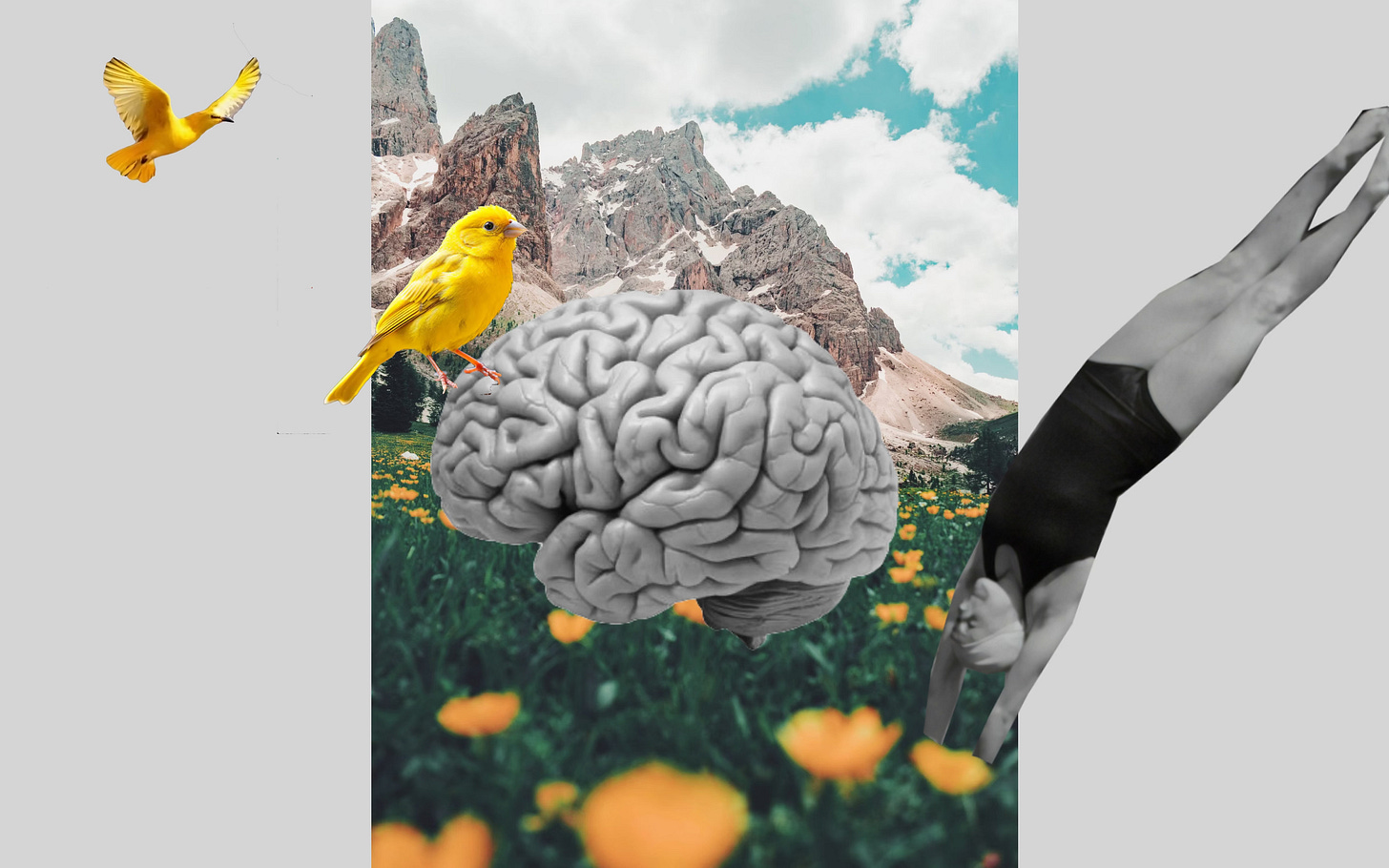Rethinking the Mental Health Crisis
Hello and welcome to rewilding philosophy. Your letters for ekophilosophical health in the Anthropocene.
As our technological and material advancements rise, so does an unsettling dearth of mental wellbeing. We are a society rich in conveniences but impoverished in spirit. While it's become commonplace to focus on psychological solutions, the overlooked healing might come from philosophy. In this letter, I'll unravel how philosophy might fortify our minds and spirits against today's challenges and how it might offer a new frontier for personal and societal regeneration.
In his recent podcast, Nate Hagens discusses how we are living in a mentally and physically sick society. Despite significant technological advancements and material gains, we've seen a corresponding decline in mental health and attention to our inner lives.
Yet, as he writes
“the Superorganism and the Self coexist in a recursive dance: while the Superorganism influences individual experiences, those experiences collectively influence the Superorganism. The centuries-long prioritization of profit over wellbeing is casting a shadow over the lived experiences of individuals: as material wealth and convenient consumption soar (for many), we are seeing increasingly deteriorating mental health and social fragmentation.”
He continues saying that mental health and resilience are about the most important things that are going to be needed.
Of course, he wasn’t the first person saying this. Many Indigenous peoples have long stressed the importance of balance and harmony with nature, warning about the repercussions of prioritizing material wealth over spiritual and community well-being. The Lakota, for instance, caution against excessive focus on material gain. In "Small Is Beautiful," Schumacher criticized economic practices that value growth over human well-being. Meanwhile, bell hooks discusses how race, capitalism, and media promote a consumption culture that harms emotional and spiritual health, advocating for love, community, and self-awareness as antidotes. In fact, for many people who work in regeneration, mental health has become a key concern. Steffi Bednarek who recently published a book on “Climate, Psychology and Change” with contributors such as Thomas Hübel, Bayo Akomolafe and Sally Weintrobe talks about the need for such a change within us.
The Overlooked Aspect of Philosophical Health
While psychological and physical health and their relation to climate change, species extinction, and many other of our current predicaments are becoming increasingly recognised and understood, what is still overlooked is philosophical health.
Mental health is not just psychological, it is also philosophical.
The line between philosophy and psychology is not clear cut - as are most lines. In fact, psychological therapies, such as cognitive behaviour therapy, were developed based on practical philosophy, thus already integrating philosophical principles. Moreover, the fragmentation into disciplines has made dealing with the complexities of the Anthropocene difficult. Dividing psychological, philosophical, and physical or planetary health is artificial, as the One Health approach, which emphasizes the relationships between healths, shows.
And yet, One Health is made out of relationships between the parts and one of such parts is our philosophical health.
While acknowledging that compartmentalizing health can be limiting, it also enriches our understanding. The goal isn't to overcome analysis but to remember to relate before, during, and after analysis.
Having said all that, I want to repeat: mental health is not just psychological, it’s also philosophical.
One way philosophical health makes itself known is through self-help, which is often dismissed as not being “real psychology” and not taken very serious by academics and intellectuals. But self-help has deep roots in philosophy. While modern self-help often lacks relational values and care for the whole, practical philosophy, as Jules Evans notes, is
“self-help of the very best kind, that doesn’t focus narrowly on the individual, but instead broadens our minds and connects us to society, science, culture and the cosmos.” Or as Cicero would say, it teaches us to “be doctors to ourselves”.
Becoming philosophically healthy - while still bound to some degree - is something each of us can practice, regardless of our genetic and biological makeup and social-ecological conditioning. The human mind is not only able to emotional self-regulate (the ability to purposefully influence one's emotional state) and to consciously control one's attention. The human mind is also capable to of an inner self-regulation concerning what we believe.
Our philosophy is the part that the self can actively steward and nurture, despite turmoil. It's the aspect of our being that can remain healthy even if eventually, the whole world goes apocalyptic on us. As Thomas Mezinger points out
“Our solution must be something deeper. And if it is not accepted by the majority, as the catastrophe continues to unfold, this solution must at least still work on the level of an individual’s life, making life worth living for each person in a dangerous world and a time of failure. Ultimately, it is also about our mental health.”
The mental health he continues talking about is a philosophical health.
Although the term 'philosophical health' is rather new, the concept has historic roots in thinkers like Socrates, Epicurus, the Stoics, Nietzsche, Bergson, and Wittgenstein. Definitions of philosophical health can be found in the anthology on philosophical health edited by Luis de Miranda.
Understanding ekophilosophical Health

I interpret ekophilosophical health as having our ontology, epistemology, and ethics in right relation to reality. Or in other words: We become ekophilosophically healthy when our actions align with our beliefs and our beliefs align with our ecos - our physical home (which includes our body, our community as well as the more-than-human world that we are part of). I think it’s important to add the prefix of eko to acknowledge and keep the awareness of the physical, material reality of our aliveness.
To achieve this, we have to know what our beliefs are and we have to know our ecos.
Philosophical health can therefore be achieved through the practice of philosophy which starts by knowing oneself deeply - as a relational self that is always already entangled and embedded with its environment. Because it’s for knowing ourselves that we can enact self-determination and mental autonomy. The second part of practicing philosophy is therefore to practice living according to those beliefs, values and principles.
Note that I don't claim this inner, philosophical reality is the ultimate reality. Our inner reality is real, as are material and social realities (the ecos). This is not about reducing everything to a philosophical premise but rather including philosophical questions as generative of a good life.
To create regenerative systems, we need ekophilosophical health, and regenerative systems ensure ekophilosophical health. As clinical psychologist Dr. Sanah Ahsan writes in the Guardian:
“The most effective therapy would be transforming the oppressive aspects of society causing our pain.
I want to make clear again that getting to know ourselves - famous through the inscription on the ancient Greek temple of Apollo at Delphi, "Know thyself" (γνῶθι σεαυτόν) - doesn’t mean to merely get to know ourselves as bounded individuals, because that’s truly not who we are, instead, we are entangled, relational, ecological beings that are co-constituted with our environment. Knowing that and knowing our ecos well is part of knowing ourselves.
A key for overcoming the mental health crisis is understanding that we are not (only) psychologically unwell, but that we are philosophically unwell.
We are facing a philosophical health crisis.
We become philosophically healthy when our actions align with our beliefs and values. Which has become increasingly difficult in this world.
Old belief systems crumble, yet our structures reflect those beliefs and values and resist change.
Rigid frameworks. Like diamonds; unyielding.
Not only are many of our philosophies that we hold “sick”, because they are a poor representation of reality of our physical realities, our ecosystems. But also are we philosophically sick, because our values cannot be shown in our actions. We are unable to live according to our values, based on the systems that we have created that make it almost impossible to do so.
So while boundaries between psychological, philosophical, physiological and planetary health blur, it is also clear that a path towards regenerative health is a holistic one, deeply rooted in how we think and what we believe. One way forward is therefore to practice living our philosophies by not only changing ourselves, but also the structures and systems we are part of. And we change those structures and systems we are part of by changing our philosophies.
If you found these insights enriching, why not share this newsletter with a friend? Their path to understanding and embracing these concepts might start with your recommendation.



As usual, very interesting approach 🙏 Where I would go from here is to try to clarify which illnesses are rooted in philosophy as opposed to those rooted in the body or conventional psychology; while holding on to the sense that they are all interrelated anyway. So maybe I mean, which areas of ill health can usefully be approached through philosophy? Other people for a long time have also pointed to spiritual health... to what extent does that overlap with philosophical health. Definitely worth a conversation!
Really interesting. Looking back on an old journal, I remember writing “I don’t need a doctor, but a philosopher”. The angst I felt was profoundly existential - anxiety about life direction, a lack of meaning, finding purpose and so forth. In the end, I found solace in zen and Buddhism and yoga, which were philosophical soul-balms. I’d add something else to this, though: I think the very premise of “mental health” is a little flawed. It’s great we’re all now talking about it. But now we need to change the discourse again to a more holistic approach. ‘Mental health’ is deeply affected by physical and physiological health, the mind-body are intertwined. This is where we need to go next - and the philosophical aspect is, I’d say, the ‘meaning’ part which creates the third corner of the triangle - a base for good, holistic mind-body-spirit health.